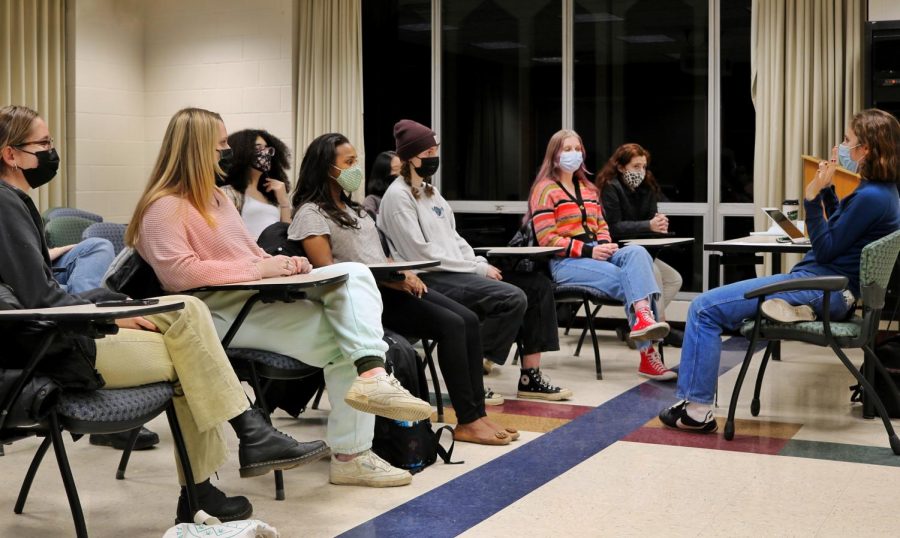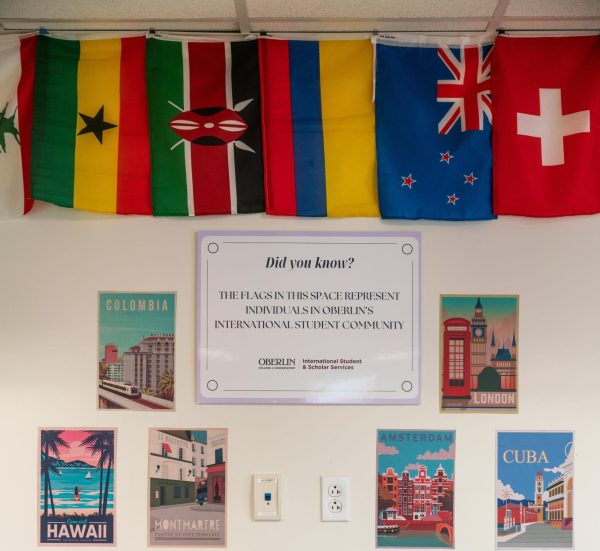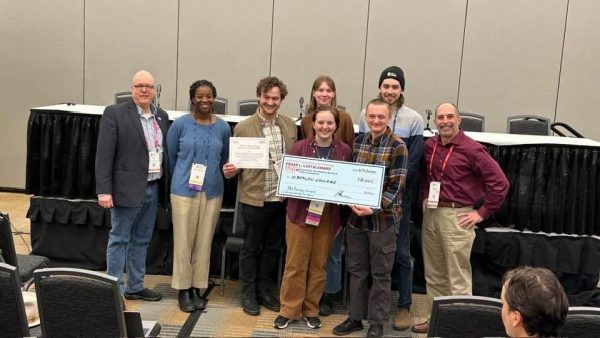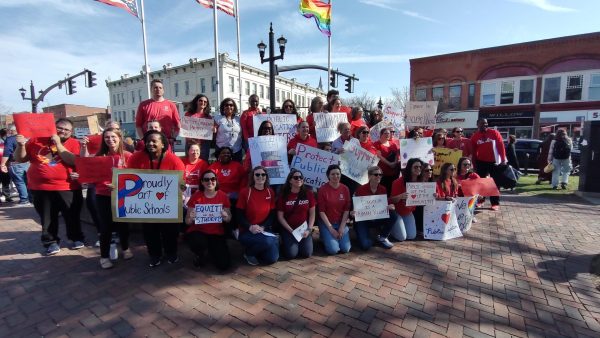Remote High School Poses Challenges for First-Years’ Transition to College
Students in the Cherry cohort PAL group wrap up their LEAD 050 course with the final meeting of the semester.
The class of 2025 entered Oberlin after nearly two years of remote learning and relaxed grading standards, accentuating an already steep learning curve that marks the transition to college. The unique circumstances facing this first-year class have resulted in some professors modifying their syllabi to help students build fundamental academic skills.
Double-degree first-year Hannah Stone is among the 876 first-years enrolled this year, and like most of her class, the latter half of her high school experience was largely remote. She felt unprepared for college academics, in part because working with academic literature, particularly scientific papers, was not something she was taught in her high school.
“COVID hit, and then I did like nothing for a year and a half,” Stone said. “I mean, my grades were fine, but I don’t think I really learned that much from Zoom school. … My school had a policy for that first semester that they would only give students either an A or an A minus or fail you entirely, so I didn’t really have to do that much.”
Chair of Rhetoric and Composition and Director of the Writing Program Professor Laurie McMillin stated that in first-year seminars, students are taught how to abandon the structure of basic, five-paragraph essays in order to build more complex arguments. The problem is that many first-years aren’t even at that baseline yet.
“With the [100-level class] that I’m teaching, I’ve had to kind of backload,” McMillin said. “I had to sort of fill in some things that I had assumed were in place. So normally I would assume that people had a much stronger sense of structure and working with a thesis and providing evidence, and I’m finding that I can’t expect that in the ways that I had in previous years.”
McMillin suggested that lower educational standards during COVID-19 may be to blame. In light of challenges posed by the pandemic, many colleges, including Oberlin, did not require SAT or ACT scores on applications this past year. She says that without a reason to study for college entrance exams or learn to produce rigid academic essays, some students are struggling to transition to college-level writing.
“I think that teachers were often more easygoing or weren’t so demanding about what they were asking,” McMillin said. “So, some students don’t have that experience of writing structured papers.”
However, McMillin acknowledged that most evidence for this impact is anecdotal. According to her, some professors have observed no such shortcomings among first-years. In fact, according to Robert and Eleanor Biggs Professor of Natural Science and Professor of Chemistry Matthew Elrod, remote learning seems to have done the opposite for first-year students in Chemistry classes.
“We might be more resilient towards a potential pandemic-caused problem of readiness to succeed than other introductory level courses because we have always had students with a wide range of high school chemistry backgrounds and have designed the first several weeks of the course to help bring everyone up to speed,” Elrod wrote in an email to the Review.

While STEM classes may move at a fast pace, introductory courses tend to be structured with an assumption of little-to-no background knowledge. As a result, motivated first-years will likely find themselves no more challenged than they would have in previous years.
“Coincidentally, this topic was recently discussed at one of our weekly meetings of all CHEM 101 instructors,” Elrod wrote. “We were surprised to find that there wasn’t a significant difference in readiness to succeed in CHEM 101 compared to pre-pandemic years. If anything, the students seem more engaged (presumably because they are happy to have a fully in-person class experience).”
College second-year Chudi Martin Jr. expressed similar sentiments about the enthusiasm of the first-year students. As a Peer Advising Leader, Martin Jr. works to ensure that students have access to resources during their first year. According to Martin, his PALees have been itching to reclaim the academic and social experience they lost as a result of COVID-19.
“The biggest thing about the class of 2025 — I’d say they have a lot of energy, and they’re very driven to do work and have a college experience in that sense,” Martin said. “I think, from my experiences being a PAL as well, a lot of my students reach out and asked, ‘What are opportunities that we can take advantage of?’”
Administrators overseeing academic programs also anticipated the challenges that these students might face as they started their college careers. According to Associate Dean of the College of Arts and Sciences and First-Year Seminar Program Director Elizabeth Hamilton, in addition to normal peer-to-peer resources the school offers, like the Quantitative Skills Center and Oberlin Workshop and Learning Sessions, the school also designed one-module courses to better support students.
“We have also developed new Learning Lab courses on essential college skills,” Hamilton wrote in an email to the Review. “Academic Writing Through Transition (LLAB 101) and Quantitative Thinking (LLAB 102) offer just-in-time practice and encouragement for students to be successful in any major that they pursue.”
McMillin has faith that students will catch up, but she emphasizes that professors need to acknowledge that COVID-19 has deeply impacted the way students learn, and there’s no going back.
“As long as teachers are flexible, and if they see a need and then work to fill it, the students will learn,” McMillin said. “Our students are freaking brilliant. I love them. You know, they’re still Obies in that way. They’re so smart, but we gotta be on our toes.”






